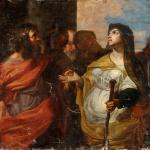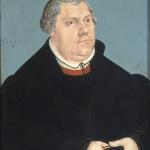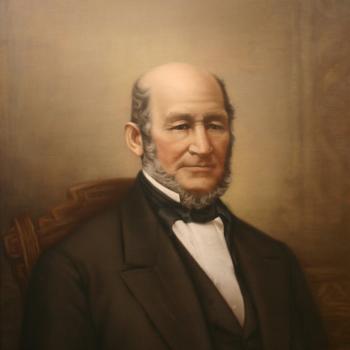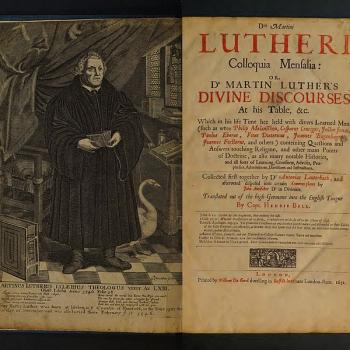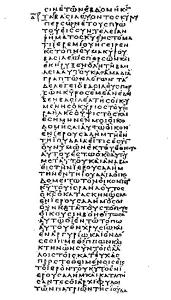
You can’t make this stuff up:
The Canon is closed:
“Scripture was Scripture before the canon was declared. Vatican I and Vatican II both state this. The canon is not Scripture itself, but the authoritative list of biblical books. Thus, there is no difficulty in saying ‘Scripture existed before the canon was declared.’ Indeed, this was necessarily the case, since declaring a list of biblical books presupposes that there are biblical books to be listed! The point of the canon was to end dispute once and for all as to which books are part of the Bible, since some didn’t accept various books, and others thought books were Scripture that were not (as later determined by councils and popes and general consensus).”
“I would say that many Christians largely knew what books were part of Scripture, but not exactly or with precision, and that’s where the Church’s declarations were important and necessary: to remove any remaining doubt and make it more certain what books were in the Bible.”[source] [a Facebook post of mine, dated 3-13-12]
The canon is open:
“The fourth question of the Capita Dubitationum asked whether those books that were not included in Trent’s list, but were included in the Latin Vulgate (e.g. The Book of Esdras, 4 Ezra, and 3 Maccabees), should be rejected by a Conciliar decree, or should they be passed over in silence. Only three Fathers voted for an explicit rejection. Forty-two voted that the status of these books should be passed over in silence. Eight bishops did not vote. The majority won, and Trent deliberately withheld any explicit decision on these books.
…The question of Esdras’ canonical status was left theoretically open.” [Gary Michuta, Why Catholic Bibles are Bigger (Michigan: Grotto Press, 2007), pp. 240-241].
All that is required here is for me to further clarify that the books that were declared by Trent certainly are part of the canon of Scripture (all doubt is removed about those, for those who accept Catholic conciliar authority); and the books that were not declared upon at all there (including [I] Esdras), are “theoretically open,” as Gary put it. Since Gary is the leading Catholic apologist today on the topic of the canon, I gladly yield to his opinion. Having now done that, there is no contradiction between us, since we agree. That said, it’s a pretty minor textual issue that we’re discussing with regard to Esdras, as will be seen when we examine it more closely.
***
“Please Hit ‘Subscribe’”! If you have received benefit from this or any of my other 4,600+ articles, please follow this blog by signing up (with your email address) on the sidebar to the right (you may have to scroll down a bit), above where there is an icon bar, “Sign Me Up!”: to receive notice when I post a new blog article. This is the equivalent of subscribing to a YouTube channel. Please also consider following me on Twitter / X and purchasing one or more of my 55 books. All of this helps me get more exposure, and (however little!) more income for my full-time apologetics work. Thanks so much and happy reading!
***
Esdras is almost all simply a reiteration of parts of 2 Chronicles, Ezra, and Nehemiah. The great Protestant scholar F. F. Bruce gives it short shrift in his book, The Canon of Scripture (Downers Grove, Illinois, InterVarsity Press, 1988, p. 47), describing it as “a variant Greek edition of the history from 2 Chron. 35:1 to Neh. 8:13).” Michuta adds: “Only a short section of this book (Esdras 3:1-5:6) contains unique material. Most of the book is a repetition of 2 Chronicles, Ezra, or Nehemiah” (Ibid., p. 239). Encyclopaedia Britannica (“First Book of Esdras”) summarizes more specifically:
The work is textually more closely related to the Old Testament than other books of the Apocrypha, for it traces portions of Israel’s history from 621 BC to 444 BC by summarizing II Chronicles 35:1–36:23, the whole of the canonical Book of Ezra, and Nehemiah 7:73–8:12.
So what is the nature of the unique portion? The same article opines:
The only new material is the “Tale of the Three Guardsmen,” a Persian folk story that was slightly altered to fit a Jewish context. The method used in compiling I Esdras is uncertain, especially because of numerous historical inconsistencies and errors; in several instances it also alters biblical texts.
We’re talking about two chapters and six verses of a third (93 verses, about 2211 words, and about 2.8 pages in my RSV): that are different from other portions of the Old Testament agreed upon by all. Wikipedia (“1 Esdras”) adds: “Many Protestant and Catholic scholars assign no historical value to the sections of the book not duplicated in Ezra–Nehemiah.”
None of this information — predictably –, was included in Swan’s little potshot. It didn’t fit the plan and goal, you see. If that’s scholarly consensus today, it looks like Trent was right on the money almost 500 years ago, and acted wisely and correctly in passing over making a declaration about the canonicity of Esdras. Lastly, the Wikipedia article provides a handy summary of the overlap of Esdras and other books (I modified the order a bit):
II Chr. 35 = I Esd. 1:1-33
II Chr. 36 = I Esd. 1:34-58
Ezr. 1 = I Esd. 2:1-14
Ezr. 2 = I Esd. 5:7-46
Ezr. 3 = I Esd. 5:47-65
Ezr. 4:1-5 = I Esd. 5:66-73
[Ezra 4:6 is not found in Esdras]
Ezr. 4:7-24 = I Esd. 2:15-30a
Ezr. 5 = I Esd. 6:1-22
Ezr. 6 = I Esd. 6:23 — 7
Ezr. 7 = I Esd. 8:1-27
Ezr. 8 = I Esd. 8:28-67
Ezr. 9 = I Esd. 8:68-90
Ezr. 10 = I Esd. 8:91-9:36
Neh. 7:73-8:12 = I Esd. 9:37-55
Swan’s post, seen in this light, is what Shakespeare described in Macbeth: “a tale told by an idiot, full of sound and fury, signifying nothing.”
*
Practical Matters: Perhaps some of my 4,600+ free online articles (the most comprehensive “one-stop” Catholic apologetics site) or fifty-five books have helped you (by God’s grace) to decide to become Catholic or to return to the Church, or better understand some doctrines and why we believe them.
Or you may believe my work is worthy to support for the purpose of apologetics and evangelism in general. If so, please seriously consider a much-needed financial contribution. I’m always in need of more funds: especially monthly support. “The laborer is worthy of his wages” (1 Tim 5:18, NKJV). 1 December 2021 was my 20th anniversary as a full-time Catholic apologist, and February 2022 marked the 25th anniversary of my blog.
PayPal donations are the easiest: just send to my email address: [email protected]. Here’s also a second page to get to PayPal. You’ll see the term “Catholic Used Book Service”, which is my old side-business. To learn about the different methods of contributing (including Zelle), see my page: About Catholic Apologist Dave Armstrong / Donation Information. Thanks a million from the bottom of my heart!
*
***
*
Photo Credit: 4th century Codex Vaticanus, from the Vatican Library, containing 1 Esdras 1:55-2:5 [public domain / Wikimedia Commons]
Summary: Anti-Catholic James Swan sez that I contradict fellow Catholic apologist & friend Gary Michuta on the canonicity of 1 Esdras. I don’t, & it’s a more complex issue, too, as I prove.


